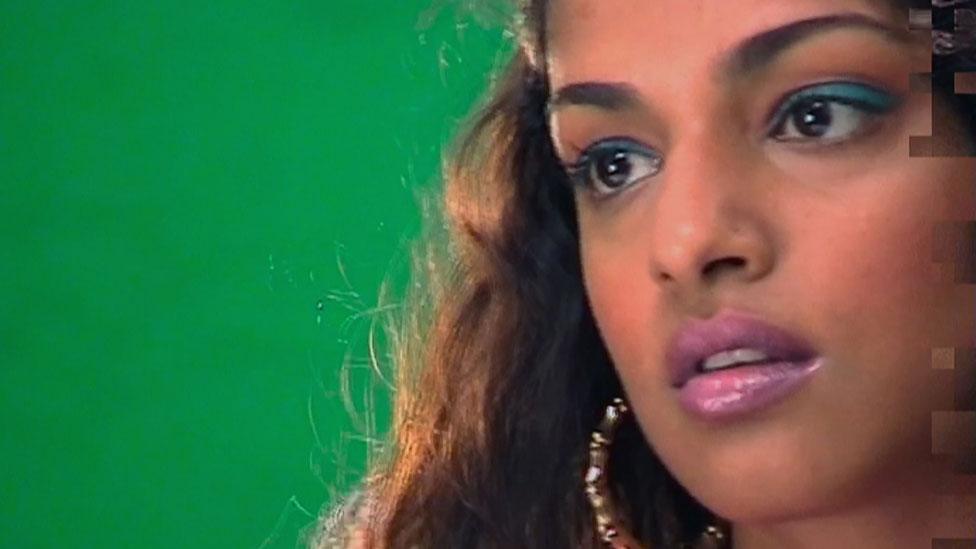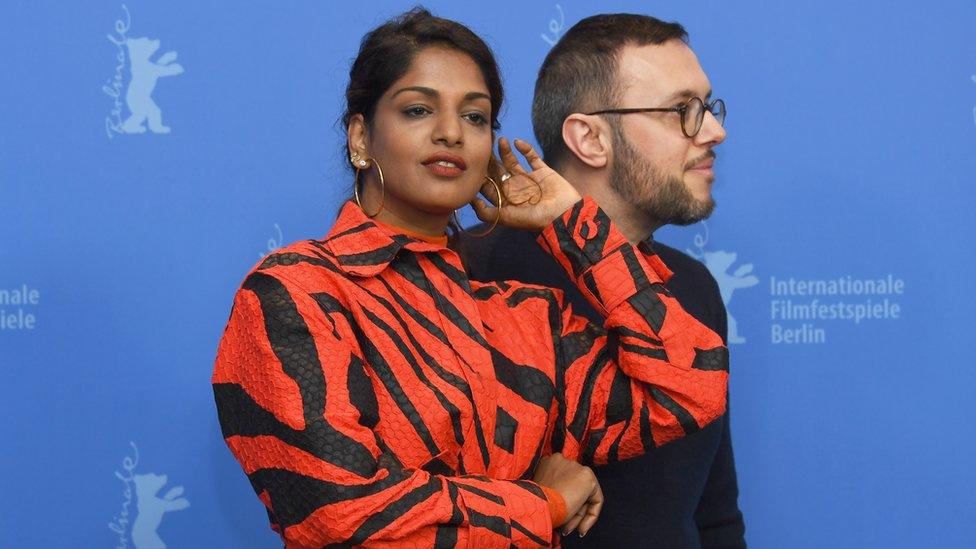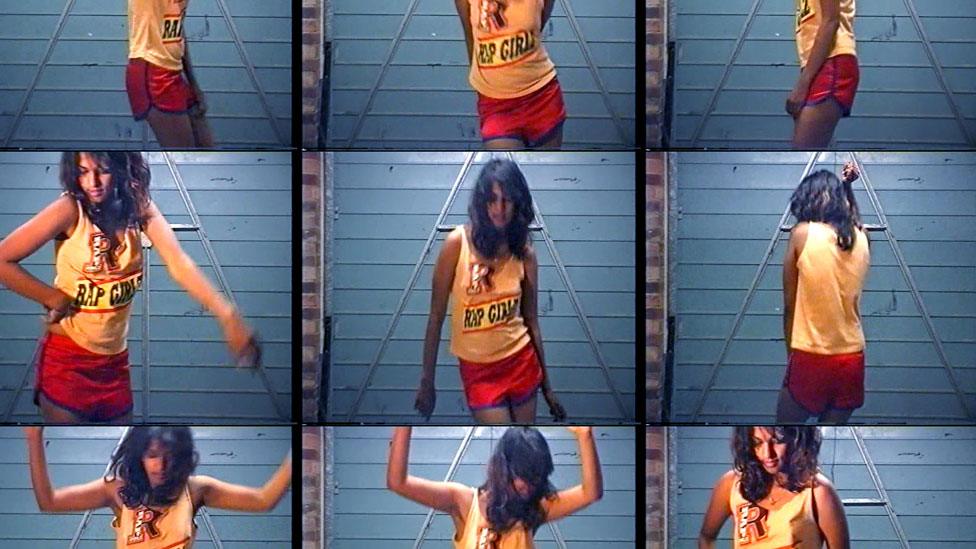Why M.I.A film is 'free therapy' for singer
- Published

The film spans more than 20 years of M.I.A's life
She's a self-confessed "problematic pop star" - and now M.I.A has a documentary about herself which might address some of those issues, although, true to form, the film itself has caused the artist a few more well-publicised problems.
Matangi/Maya/M.I.A, by Steve Loveridge, a friend M.I.A met while studying at Central St Martins College in London, has featured on the programme of this year's Berlin International Film Festival.
It spans more than 20 years of M.I.A's life, including footage she shot herself of her family in London, and in Sri Lanka, where she was born Matangi Arulpragasam in 1975. It includes her thoughts on her father, who was part of the Tamil resistance during the Sri Lankan civil war, and her family coming as refugees to London when she was 10-years-old.
It also deals with more controversial aspects of her career after she became a global star following the success of Paper Planes in 2007, including the video for Born Free in 2010, which featured imaginary genocide against red-haired people, an unflattering profile of her by the New York Times which attracted worldwide attention, and a lawsuit filed by the N.F.L after she extended a middle finger to the camera while performing at the Super Bowl in 2012.
The film has been praised, with critics calling it "as suitably disordered as its exciting pop innovator" - but M.I.A says she cried when she saw it, adding "the shock of having so much personal stuff in there about me was very difficult".

M.I.A says she needs time to "digest" Steve Loveridge's film
"I'm going to have to treat it as free therapy," she adds.
Loveridge, who moved to New York in 2014, had kept creative control of the film, which took eight years to make, and had more than a thousand hours of material to choose from, much of it filmed by M.I.A herself.
There had been reports she was unhappy with the documentary after seeing it, but M.I.A says she "needs time to digest it" and she and the director "would need to have a few conversations".
M.I.A points out that the political landscape of 2018 is very different to 2010, when she first suggested Loveridge might want to make a film about her. "Being an activist in music is now seen as acceptable," she claims, "although it's like you're handed a leaflet on what you are allowed to say within the 'political activism' section of being a pop star."
She adds she still feels hurt after she stepped down from playing the Afropunk festival in London in 2016, after commenting on the Black Lives Matter movement in the USA, saying she thought the the concerns of Muslims weren't being addressed either.
"I only asked a question about Muslim lives mattering, as part of a conversation. When I tried to touch on this two years ago, I was ambushed in the press and banned from festivals. Why are some issues problematic and not others?" she questions.

The singer wants to be a film-maker in the future
M.I.A says at some point her next step would be to fulfil her childhood ambition of film-making, lamenting what she perceives as the lack of creativity in the music industry.
"Music has become so narrow and corporate. To be a famous singer, you can go to Brit School, you can go on X-Factor, or maybe you are born into it.
"It's not like bands often meet at school now and have a community spirit. I think music has become catalogue fodder, a corporate thing that when we bring Artificial Intelligence into it, for example, using holograms for tours, the human aspect is going to disappear even further.
"When I came as a refugee to England everyone said 'become a pop star, that's the best thing you can do, that's 'it', so I did that. Then they said, 'move to Beverly Hills and marry a prince and be Cinderella' and I did that too.

M.I.A: "Bad things happen in life... It's all about your ability to turn the bad things around"
"I have been constantly trying to find what 'it' is in my life and I think now it's just making work. I just like working. That's always what I've done. All the consequences of that - all the flak I've taken over the years - they've taught me about society and that feeds into the work I make."
While even her worlwide hit Paper Planes was about negative perceptions about immigrants, M.I.A says she hopes "people won't watch my story and think it's just about refugees".
"It's more universal than that, it's about taking negatives and turning them into positives. I actually can't wait to show this film to my brother and sister as we all digested our early experiences differently.
"Bad things happen in life and that's a given. It's all about your ability to turn the bad things around and how quickly you can turn it around. I get that we're in this weird Instagram phase where people put up positive quotes every day, but really you need that positive attitude all your life."
Loveridge hopes refugees will take hope from M.I.A's story. "Within one generation of coming to Britain, Maya's become a pop star, she's done incredible creative things. And if she hadn't been an artist, she could easily have been a doctor or a scientist. I hope that the story gives people hope."
Matangi/Maya/M.I.A will be released later this year.

Follow us on Facebook, external, on Twitter @BBCNewsEnts, external, or on Instagram at bbcnewsents, external. If you have a story suggestion email entertainment.news@bbc.co.uk, external.
